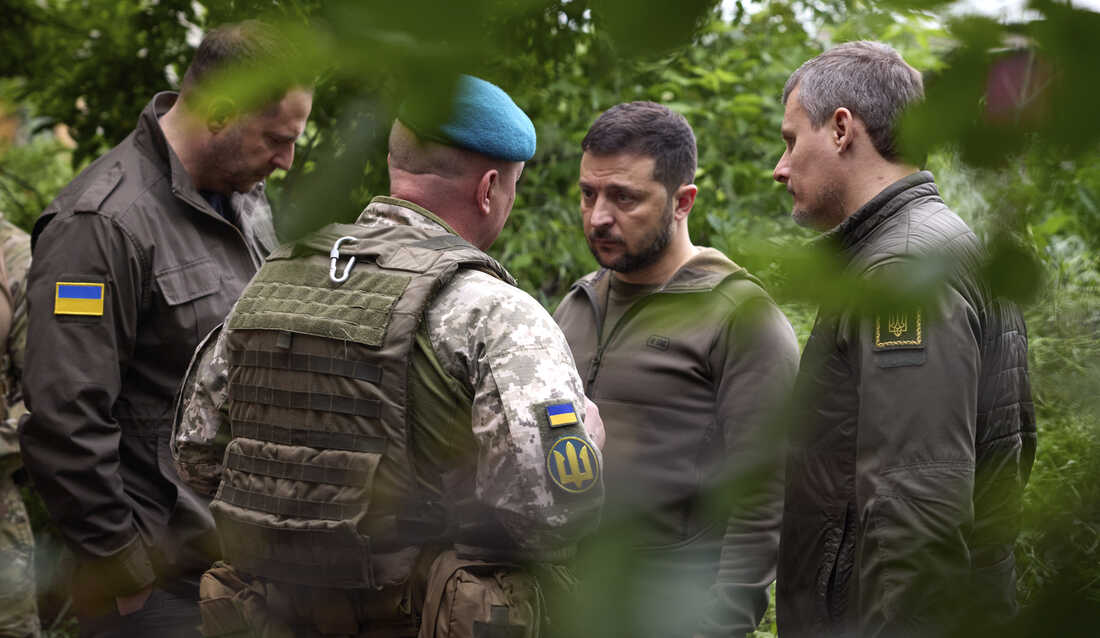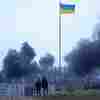
[ad_1]

Ukrainian President Volodymyr Zelenskyy listens to navy commanders as he visits the jap Donetsk area, an space of heavy preventing, on Tuesday. Zelenskyy and different Ukrainian officers say a serious navy offensive is prone to begin quickly.
AP
conceal caption
toggle caption
AP

Ukrainian President Volodymyr Zelenskyy listens to navy commanders as he visits the jap Donetsk area, an space of heavy preventing, on Tuesday. Zelenskyy and different Ukrainian officers say a serious navy offensive is prone to begin quickly.
AP
Major navy operations are usually shrouded in secrecy. But Ukraine’s deliberate offensive towards Russia has been a part of a vigorous public debate for months. This has created a variety of expectations.
“In the best case, the Ukrainians really liberate a lot of territory, perhaps even pushing the Russians back to the line on Feb. 23 of last year before this massive Russian invasion began. That would be a huge blow to Moscow,” stated Steven Pifer, a former U.S. ambassador to Ukraine who’s now at Stanford University’s Center for International Security and Cooperation
This state of affairs would reverse Russia’s most vital navy achieve over the previous yr, the creation of a land bridge connecting Russian troops in jap Ukraine — the Donbas area — to Russian forces within the south — in Crimea.
But Pifer acknowledges that is fairly optimistic.
“Probably a more realistic expectation is that the Ukrainians take a good chunk of territory back, something that would be seen in the West as underscoring that Ukraine has the potential to win,” he added.
The U.S. and different NATO nations are sending Ukraine tanks, drones and artillery — giving it extra firepower than ever — because it plans this offensive.
The West additionally lately pledged to satisfy Ukraine’s long-standing request for F-16 fighter jets, although the Ukrainian air drive should nonetheless learn to fly and keep these American planes, a course of anticipated to take months.
Meanwhile, this prolonged Ukrainian buildup has given Russia time to bolster susceptible spots within the south and east, the place Ukraine is probably to assault.
Satellite photographs present the Russians digging recent trenches to defend potential Ukrainian approaches to Crimea, and Russia has reportedly been sending in extra troops to the area.

Ukrainian troopers experience atop an armored personnel service in Ukraine’s jap area of Luhansk on Sunday.
LIBKOS/AP
conceal caption
toggle caption
LIBKOS/AP

Ukrainian troopers experience atop an armored personnel service in Ukraine’s jap area of Luhansk on Sunday.
LIBKOS/AP
When will the offensive start?
For all the general public chatter in regards to the offensive, Ukraine has stored secret the time it plans to launch the operation in earnest. Ukrainian political and navy leaders are repeatedly requested this query, and so they have a pat response: “soon.”
Some analysts say the preliminary phases of the offensive may already be underway, a reference to a spate of shock, comparatively small assaults inside Russia.
This contains the pair of drones that hit the Kremlin in Moscow earlier this month, inflicting solely minor bodily injury to the domed roof of a constructing, however delivering a psychological jolt to the Russians.
Ukraine is deliberately imprecise about assaults inside Russia, neither confirming nor denying involvement. But there’s an virtually common perception Ukraine is accountable, and this can be a means of conserving Russia off-balance upfront of the offensive.
Michael Kofman, who’s on the Center for Naval Analyses, a U.S. government-funded assume tank, believes a Ukrainian offensive can succeed. But he stated it’s going to virtually definitely be more difficult than the one final fall that drove Russian troops out of considerable areas within the northeast and the south.
“It may require multiple offensives on multiple fronts and will likely be conducted over the period of several months rather than days or weeks,” Kofman stated.
“I think that Russian forces have to be seen to be decisively beaten in this operation. Ukraine needs to demonstrate in this phase of the war that it’s still capable of breaking through Russian lines,” he added.
Ukraine’s offensive comes with large dangers. Angela Stent at Georgetown University stated Ukraine must advance on the battlefield to take care of the robust degree of political and navy assist it is receiving from the West.
“If they don’t show much success, it’s going to be much harder to justify supplying all the weapons,” Stent stated. “I think Ukraine could say, if they take back some territory, ‘Look, we’re making progress. It’s very tough. We still need the equipment, the money, and please send us more.'”
Kofman famous that Ukraine and its Western supporters may nicely have completely different definitions of success.
“The honest answer is, I think we’ll know it when we see it,” he stated. “And it will to some extent be subjectively interpreted by different capitals in Europe and amongst Ukraine’s other Western partners.”
An offensive prone to be large, however unlikely to finish the battle
The analysts agree on one other key level. Regardless of how this Ukrainian offensive performs out, they do not assume it’s going to convey the battle to an in depth.
They see Russian chief Vladimir Putin taking part in the lengthy sport, believing he can put on down Ukraine’s navy and sap the need of the West to offer sustained assist.
“Russia has three times the population of Ukraine, so the Russians still have hundreds of thousands of young men, cannon fodder, whom they can conscript,” Stent stated.
“Ukraine doesn’t have endless numbers of young men it can send to the front. Russia could go on putting people on the battlefield longer than Ukraine can,” she added.
Steven Pifer, in the meantime, was a long-time diplomat. But he does not assume now could be the fitting time for peace talks.
“I believe at some point there will be a negotiation in this war between Kyiv and Moscow, but not now and not while the Russians have shown absolutely no indication that they’re serious,” he stated.
“You’ll see people suggesting, ‘Well, it’s time to encourage the Ukrainians to negotiate. I don’t agree with that,” he added. “I worry about the people who are prepared to start talking about what kind of territory Ukraine should cede to Russia, even though it’s not their territory to give away.”
Ukraine has repeatedly shocked the world all through the battle, Pifer stated. Be ready, he added, to be shocked once more.
Greg Myre is an NPR nationwide safety correspondent. Follow him @gregmyre1.
[adinserter block=”4″]
[ad_2]
Source link

